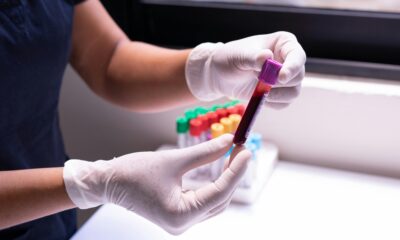Health
Dealing with the Side Effects of Chemotherapy
Published
10 months agoon

Chemotherapy is a potent and widely used treatment for cancer. It is effective in targeting and destroying cancer cells, but it can also lead to a range of side effects that can be challenging for patients to cope with. Understanding these side effects and learning how to manage them effectively can significantly improve the quality of life for individuals undergoing chemotherapy. In this article, we will explore common side effects of chemotherapy and provide strategies for dealing with them.
Common Side Effects of Chemotherapy
Chemotherapy targets any rapidly dividing cells, which includes cancer cells. However, because it affects healthy cells as well, it has a number of nasty side effects. These side effects can vary from person to person and depend on the specific chemotherapy drugs used. Some common side effects include:
Nausea and Vomiting: These are among the most well-known side effects of chemotherapy. These symptoms can be distressing but can often be managed effectively with medications prescribed by your healthcare team. In the UK Cannabis is sometimes used to help ease these symptoms.
Fatigue: Fatigue, or extreme tiredness, is a common side effect of chemotherapy. Clearly, this will interfere with daily activities and may persist for several weeks after treatment.
Hair Loss: Many chemotherapy drugs cause hair loss. Hair loss can be emotionally challenging for many patients, and some may choose to wear wigs, scarves, or hats.
Changes in Appetite and Taste: Some people experience changes in their appetite or taste preferences during chemotherapy. Maintaining proper nutrition is essential, and working with a dietitian can help address these challenges.
Anaemia: Chemotherapy can lead to a drop in red blood cell counts, resulting in anaemia. Anaemia can cause fatigue and weakness and may require treatment with iron supplements or blood transfusions.
Low Blood Cell Counts: Chemotherapy can reduce the number of white blood cells, which increases the risk of infection. Following recommended hygiene practices and avoiding sick individuals can help reduce this risk.
Mouth Sores: Chemotherapy can cause mouth sores and mucositis. Proper oral hygiene and the use of prescribed mouthwashes can help manage these symptoms.
Peripheral Neuropathy: Numbness, tingling, and pain in the extremities are common side effects of some chemotherapy drugs. Physical therapy and certain medications may help alleviate these symptoms.
Strategies for Dealing with Side Effects
Dealing with the side effects of chemotherapy requires a proactive and holistic approach. Here are some strategies for managing these challenges effectively:
1. Communicate with Your Healthcare Team:
Always communicating openly and honestly with your healthcare providers is essential. They have seen many patients through treatment and can provide guidance, adjust your treatment plan if necessary, and prescribe medications to alleviate specific symptoms. Talking to specialists such as cannabis clinics about your medication or condition can help you understand your options.
2. Manage Nausea and Vomiting:
Nausea and vomiting can be debilitating, but there are several strategies to help control these symptoms:
- Take anti-nausea medications as prescribed.
- Eat small, frequent meals.
- Avoid strong-smelling or greasy foods.
- Stay hydrated with clear liquids.
- Consider alternative therapies like acupuncture or acupressure.
3. Maintain a Balanced Diet:
Good nutrition is crucial during chemotherapy. If you’re experiencing appetite loss or taste changes, speak to a dietitian for personalised recommendations. They can provide personalised recommendations tailored to your specific needs, ensuring you’re getting the essential nutrients your body requires to cope with treatment effectively. There are specialised foods designed to medically provide all the nutrients you need in an easy-to-consume way – such as a milkshake.
4. Stay Hydrated:
Dehydration can exacerbate many side effects, so it’s essential to drink enough fluids. Aim for at least eight cups of water a day, and consider oral rehydration solutions if needed. Remember that if you are warm or doing any kind of exercise, you will need to increase your fluid intake.
5. Manage Fatigue:
Fatigue can be overwhelming, but some strategies can help you manage it:
- Prioritise rest and sleep.
- Engage in gentle exercise, such as walking or yoga.
- Break tasks into smaller, manageable segments.
- Seek help from friends and family with daily chores and responsibilities.
6. Address Hair Loss:
Hair loss is a common side effect of chemotherapy and can affect self-esteem. Consider the following:
- Experiment with wigs, hats, or scarves.
- Embrace the bald look if you’re comfortable.
- Talk to a therapist or support group about your feelings regarding hair loss.
7. Combat Anaemia:
If you experience anaemia due to chemotherapy, work with your healthcare team to address it:
- Discuss iron supplements or erythropoiesis-stimulating agents (ESAs) with your doctor.
- Increase iron-rich food in your diet, such as red meat, beans, and leafy greens.
8. Practice Good Oral Hygiene:
To prevent mouth sores and mucositis, practice excellent oral hygiene:
- Brush your teeth (gently!) with a soft toothbrush.
- Use alcohol-free mouthwash or saline rinses.
- Avoid spicy or acidic foods.
9. Stay Infection-Free:
Maintain good hand hygiene, and be cautious when visiting crowded or unclean environments. Report any signs of infection to your healthcare provider promptly.
10. Manage Peripheral Neuropathy:
For neuropathy, consider these strategies:
- Wear gloves and supportive footwear.
- Discuss medication options with your doctor.
- Explore complementary therapies like acupuncture or physical therapy.
11. Seek Emotional Support:
Dealing with side effects can be emotionally challenging. Don’t hesitate to seek support:
- Join a cancer support group or talk to a therapist.
- Share your feelings and concerns with loved ones.
12. Consider Complementary Therapies:
Some patients find relief from side effects through complementary therapies like acupuncture, massage, or meditation. Discuss these options with your healthcare team.
13. Stay Informed:
Educate yourself about your condition, treatment, and potential side effects. Knowledge can help alleviate anxiety and empower you to take an active role in your care.
Conclusion
Dealing with the side effects of chemotherapy is an integral part of the treatment journey for many cancer patients. While these side effects can be challenging, they are often manageable with the right strategies and support. Effective communication with your healthcare team, maintaining a healthy lifestyle, and seeking emotional and practical support are key components of successfully navigating the side effects of chemotherapy. By actively addressing these challenges, patients can enhance their quality of life and optimise their overall well-being during their medical journey.
Recent News


4 Amazing Trips for Your Family
Choosing somewhere for a family vacation that would pique the attention of adults and kids alike can be a fun...


Customising Your Makeup with Blendable Blush Options
In cosmetics, one’s face is a canvas for self-expression and creativity. Among the myriad of products available, blush is a...


The Benefits of Regular Home Maintenance
Regular home maintenance is essential for maintaining and even raising the value of your house. A proactive approach to repairs...


Understanding the Importance of SEO in Adelaide
In the digital marketplace, Adelaide businesses are in a continuous contest to gain the attention of their target audiences. With...


Breaking Down the Numbers: Understanding the Average Traveling Nurses Pay
The open road, adventure, and the chance to heal – travel nursing promises an undeniable allure. But amidst the excitement,...


Dealing with Oily Skin in Summer: Tips and Tricks
As the temperature rises, those with oily skin often face an additional challenge—maintaining a clear and balanced complexion. Excess oil...


Mountain Wedding Ideas for 2024
A mountain wedding is a stunning choice for couples who cherish nature and desire a distinctive wedding experience. Whether you...


3 Of The Best Ways To Keep Your Salon Clean
It is of the utmost importance to ensure that a salon is kept scrupulously clean, not just for the sake...


3 Reasons You Should Get Blood Tests Every Year
Regular blood tests are essential for preserving general health and identifying potential problems early on. Medical professionals can evaluate your...


How to Make Your Next Crafts Project Pop
Crafting is a creative outlet that allows individuals to express themselves through various mediums such as paper crafts, sewing, painting,...
